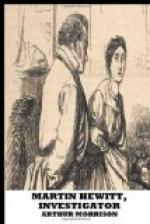Young Kentish was a six-foot sergeant of grenadiers home on furlough, and luxuriating in plain clothes. He and Hewitt walked a little way toward the town, allowing the landau to catch them up. They traveled in it to within a hundred yards of the empty shops and then alighted, bidding the driver wait.
“I shall show you three empty shops,” Hewitt said, as he and young Kentish walked down Granville Road. “I am pretty sure that Sammy Crockett is in one of them, and I am pretty sure that that is the middle one. Take a look as we go past.”
When the shops had been slowly passed, Hewitt resumed: “Now, did you see anything about those shops that told a tale of any sort?”
“No,” Sergeant Kentish replied. “I can’t say I noticed anything beyond the fact that they were empty—and likely to stay so, I should think.”
“We’ll stroll back, and look in at the windows, if nobody’s watching us,” Hewitt said. “You see, it’s reasonable to suppose they’ve put him in the middle one, because that would suit their purpose best. The shops at each side of the three are occupied, and, if the prisoner struggled, or shouted, or made an uproar, he might be heard if he were in one of the shops next those inhabited. So that the middle shop is the most likely. Now, see there,” he went on, as they stopped before the window of the shop in question, “over at the back there’s a staircase not yet partitioned off. It goes down below and up above. On the stairs and on the floor near them there are muddy footmarks. These must have been made to-day, else they would not be muddy, but dry and dusty, since there hasn’t been a shower for a week till to-day. Move on again. Then you noticed that there were no other such marks in the shop. Consequently the man with the muddy feet did not come in by the front door, but by the back; otherwise he would have made a trail from the door. So we will go round to the back ourselves.”
It was now growing dusk. The small pieces of ground behind the shops were bounded by a low fence, containing a door for each house.
“This door is bolted inside, of course,” Hewitt said, “but there is no difficulty in climbing. I think we had better wait in the garden till dark. In the meantime, the jailer, whoever he is, may come out; in which case we shall pounce on him as soon as he opens the door. You have that few yards of cord in your pocket, I think? And my handkerchief, properly rolled, will make a very good gag. Now over.”
They climbed the fence and quietly approached the house, placing themselves in the angle of an outhouse out of sight from the windows. There was no sound, and no light appeared. Just above the ground about a foot of window was visible, with a grating over it, apparently lighting a basement. Suddenly Hewitt touched his companion’s arm and pointed toward the window. A faint rustling sound was perceptible, and, as nearly as could be discerned in the darkness, some white blind or covering was placed over the glass from the inside. Then came the sound of a striking match, and at the side edge of the window there was a faint streak of light.




